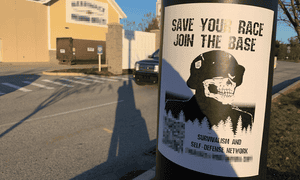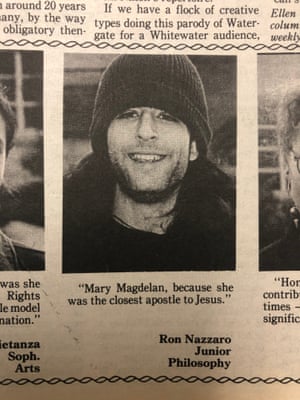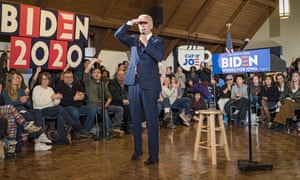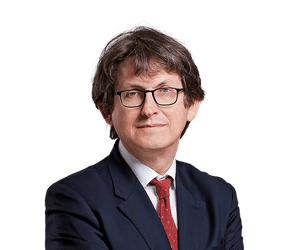Revealed: the true identity of the leader of an American neo-Nazi terror group
The white supremacist group the Base has been a target of FBI raids and its members accused of planning a race war. The Guardian can now reveal the identity of its secretive leader
Thu 23 jan 2020
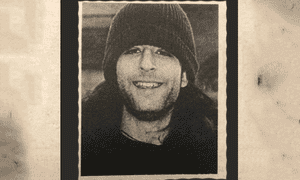 Revealed: the founder and leader of the Base, Rinaldo Nazzaro. Photograph: The Villanovan
Revealed: the founder and leader of the Base, Rinaldo Nazzaro. Photograph: The Villanovan
T
he Guardian has learned the true identity of the leader and founder of the US-based neo-Nazi terror network the Base, which was recently the target of raids by the FBI after an investigation into domestic terrorism uncovered their plans to start a race war.
Members of the group stand accused of federal hate crimes, murder plots and firearms offenses, and have harbored international fugitives in recent months.
The Base’s leader previously operated under the aliases “Norman Spear” and “Roman Wolf”. Members of the network do not know his true identity due to the group’s culture of internal secrecy.
But the Guardian can reveal that “Norman Spear” is in fact US-born Rinaldo Nazzaro, 46, who has a long history of advertising his services as an intelligence, military and security contractor. He has claimed, under his alias, to have served in Russia and Afghanistan.
The revelation of his identity comes after a months-long investigation by the Guardian into Nazzaro and the activities of the Base.
While Nazzaro’s most recently used address is in New Jersey, there is evidence supporting his claims of being based in Russia, where he lives with his Russian wife.
The Base – which is an approximate English translation of “al-Qaida” – began recruiting in late 2018. The white supremacy group, which has regional and international cells, extols the virtues of an all-out race war while specifically targeting African Americans and Jewish people.
Using encrypted apps, members of the highly organized group planned terror campaigns; vandalized synagogues; established armed training camps and recruited new members.
The US attorney for Maryland, Robert K Hur, speaking after the recent arrest of three members of the Base, said that they “did more than talk – they took steps to act and act violently on their racist views”.
Few traces of him exist anywhere
Rinaldo Nazzaro has maintained a decidedly low profile: he has no visible presence on any major social media platforms, no published writings under his own name, and no profile in local or national media.
Few traces of him exist anywhere, except where a name is required in official business – such as real estate purchases and the registration of companies.
Multiple emails and phone calls to Nazzaro went unanswered.
But through a painstaking investigation involving freedom of information requests, the analysis of material provided to the Guardian by a whistleblower inside the group, and cross-examination of information found online and in databases, the Guardian was able to piece together his identity and some of his whereabouts.
The Guardian was able to unravel Nazzaro’s identity due to his 2018 activities in a remote corner of the Pacific north-west.
In chat rooms hosted by the Base, Nazzaro stressed the importance of in-person meet-ups and required members to attend training camps. The Base’s propaganda videos show young men undergoing combat training together in rural areas.
Last August, an Oregon-based antifascist group, Eugene Antifa, warned that the Base was planning a “hate camp” in the neighboring state of Washington, and claimed Nazzaro (operating under the alias of “Spear”) had purchased land in Stevens county for training purposes. This warning came after a leak of the Base’s internal chats.
The neo-Nazi group called "The Base" is planning a 'hate camp' this month in Washington. Members are flying in from around the country to Spokane, WA this August to participate in the gathering.#DeBasedDoxx[THREAD]
1,399 people are talking about this
Local media outlets picked up the story, which led local law enforcement to urgently seek information on the group.
In emails obtained by the Guardian via public records request, the Stevens county Sheriff, Brad Manke, is seen contacting the FBI and the Southern Poverty Law Center (SPLC) for advice on the group.
On 20 August 2019, Manke writes to an FBI agent, asking: “Do you have a name for the actual head of the group The Base or the address where the property actually is?”
In a 20 September email responding to an SPLC researcher, Manke writes: “I have since learned that ‘The Base’ has purchased property in Ferry County, WA which is a neighboring county.”
Property record searches revealed that three 10-acre blocks of undeveloped land were purchased in December 2018 for $33,000 in the name of a Delaware LLC called “Base Global”. In a telephone conversation in late November, Manke confirmed that this was the block of land he had been referring to.
In recordings of two internal Base voice calls provided to the Guardian by the source, “Norman Spear” discusses his recent land purchase.
When asked why the land had been inexpensive, he replied: “Because there’s no possibility of getting utilities in there. Ever.” He continued: “But to me, that was a good thing for my purposes. I looked at it like it was just naturally secluded.”
In deeds of sale, the address provided for the company was a New Jersey post office – enough to conceal the purchaser’s identity. But separate tax affidavits associated with the purchase give a different address for Base Global.
That address is for a New Jersey apartment that has belonged to an older family member of Nazzaro since 1998. Nazzaro and his wife have also intermittently resided at that address, according to database searches.
The affidavits are also signed by Nazzaro, and dated “12/21/2018 Republic”. Republic is the seat and the only city in Ferry county, Washington.
According to a source inside the Base, this date coincided with a trip by Russia-based “Norman Spear” to the United States, during which time he had in-person meetings with members of the group.
Speculation that Nazzaro was a federal agent
The location of the land is consistent with “Norman Spear’s” advocacy of a white supremacist strategy called the Northwest Territorial Imperative (NTI), which was promoted by the deceased white supremacist Harold Covington.
The strategy argues for the creation of a separatist ethnostate in the Pacific north-west and encourages white supremacists to move to the region.
In one of “Norman Spear’s” first public appearances, on a far-right podcast recorded in December 2017, he was introduced as a Northwest Front (another white supremacist separatist group) organizer and went on to spell out a four-state plan culminating in “achieving independence, realizing the ultimate goal which is an independent nation state in the Pacific north-west, an ethnostate”.
The plan, he said, would trigger the relocation to the Pacific north-west of the white population in the United States.
Around the same time, “Spear” filmed a series of short instructional presentations on the tactics and strategy of guerrilla warfare. In an archive of those videos on the far-right site Bitchute, he is identified as “Defense Studies expert and former CIA field intelligence officer Norman Spear”.
This detail, coupled with other leads, compelled many to speculate whether “Norman Spear” was, in fact, a federal agent operating inside the Base.
The Base has emerged at a time when far-right organizing is on the rise in the US. Last year saw a spate of terror attacks by white supremacists. In August, the gunman who killed 22 people at a Walmart store in El Paso, Texas, is believed to have posted a white nationalist manifesto online prior to the attack.
In April, an attacker who killed one person after opening fire inside a San Diego synagogue killing posted a note online citing white supremacy influences and naming the gunman who killed 51 in an attack on a mosque in Christchurch, New Zealand, as an inspiration.
“We have a significant increase in racially motivated violent extremism in the United States and, I think, a growing increase in white nationalism and white supremacy extremist movements,” Jay Tabb, the head of national security for the FBI, said at an event in Washington recently.
Under the motto “there is no political solution”, the Base embraces an “accelerationist” ideology, which holds that acts of violence and terror are required in order to push liberal democracy towards collapse, preparing the way for white supremacists to seize power and institute an ethnostate.
Members remained defiant following the arrest of seven alleged members of the group in mid-January, calling it “an unjust political witch hunt” from the “Liberal Globalist System”.
Was the Base a honeypot designed to entrap people?
Beginning in 2009 and until as late as 2019, Nazzaro billed himself as an intelligence expert working with various government and military agencies.
Nazzaro is the principal of an LLC called Omega Solutions International (OSI), a company offering a range of intelligence and security contracting.
Its website, which was removed from the Internet some time after August 2019, boasted of the firm’s “experience conducting intelligence analysis for government agencies, military organizations, and private businesses”, as well as access to a network of seasoned security professionals with expertise in counterterrorism, counterinsurgency, homeland security, hostage rescue/negotiations, psychological operations, and more.
The firm also has a Cage Code, which is an administrative requirement for military and government contractors.
Materials inspected and sources consulted by the Guardian indicate that Nazzaro, as “Spear”, has faced persistent suspicions from current and former members of the group that he is a “fed”, or the agent of a foreign government, or that the Base is a “honeypot” intended to lure neo-Nazis out into the open for the benefit of law enforcement agencies.
Former members have cited this as a reason for leaving.
A connection with Russia
New York marriage records show that Nazzaro and his wife were married in New York City in 2012, during the period when Nazzaro is recorded as maintaining a midtown Manhattan address. At that time, he was recorded as having one child.
A Russian site that scrapes and archives social media accounts had captured a profile, and photos, posted by Nazzaro’s Russian-born wife to VK, the Russian social media site.
She has since hidden that profile, but other social media archives confirm the prior existence of an account in Nazzaro’s wife’s name (using her married name).
The photographs show the same person who has been presenting himself as “Norman Spear”.
Meanwhile, a reverse image search yielded a photograph matching public photos of “Norman Spear” atop advertisements for English lessons in St Petersburg, Russia.
The Guardian was only able to find one earlier photograph attached to his real name. It appeared above a vox pop in the Villanovan, the student paper of Catholic, Pennsylvania-based Villanova University, in 1994.
At the time of the photograph, “Ron Nazzaro” was described as a junior in philosophy, which is consistent with a 1973 birthdate. A source who has met “Spear” in person believes that the 1994 photo of Nazzaro is the same person he met.
A “Rinaldo Nazzaro” is also identified as a class of 1991 alumnus and donor of the prestigious New Jersey Catholic prep school the Delbarton School.
Nazzaro’s approximate age, his Italian heritage, his family’s New Jersey location, his background in “counter-intelligence”, the nationality of his spouse, and the number of his children were relayed to the Guardian as characteristics of “Norman Spear” by an internally placed source.
‘I am on the terrorism watchlist’
Richard Tobin, a Base member, is awaiting trial in New Jersey over allegations that he coordinated the September vandalism of synagogues in Michigan and Wisconsin. In a December custody hearing, the prosecuting assistant US attorney cited Tobin’s self-professed belief that “Norman Spear” was a Russian spy.
The Guardian has discovered that all of the business addresses associated with Nazzaro’s OSI LLCs are “virtual offices”. This describes a situation where a second company provides a business address, and sometimes meeting rooms and greeting services, for businesses who do not wish to maintain their own premises.
The addresses are often prestigious: OSI’s virtual address locations include Fifth Avenue in Manhattan and K Street in Washington DC, an address associated with federal government contracting and lobbying.
Meanwhile, “Norman Spear” appears to have had no extended history in the neo-Nazi movement before emerging as leader of the Base.
According to an internally placed source, the only people within the movement who vouched for “Spear” were connected to the Northwest Front (NWF). The NWF founder, Harold Covington, was himself the subject of persistent rumors within the white nationalist movement that he was a federal informant, and that NWF was itself a honeypot – a front organization routinely used by US law enforcement in order to entrap people.
“Norman Spear” has told Base members that he remains in Russia. Law enforcement sources have indicated on background that Nazzaro is believed by some agencies to be working for the Russian government.
The US government may have been monitoring “Norman Spear’s” activities for some time. In the April conversation planning a meetup in July, “Spear” was concerned that he would not be able to attend.
“I have confirmed that I am on the FBI terrorism watch list. I mean, that doesn’t really matter in the context of the training. What matters is that I’m on it.”
The Guardian’s investigation of the group continues.
